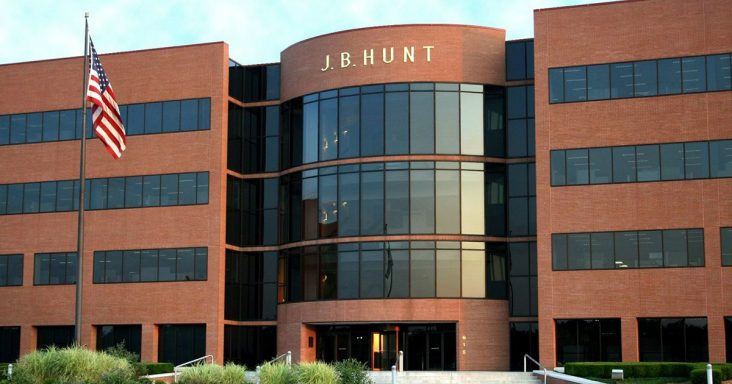Stephens analysts expect J.B. Hunt 4Q earnings, revenue to rise
by January 11, 2023 3:19 pm 1,466 views

Analysts said that Lowell-based carrier J.B. Hunt Transport Services Inc. is expected to post an increase in fourth-quarter earnings amid a soft freight market. Meanwhile, J.B. Hunt has reached a long-term deal to add more than 15,000 trailers in the coming years.
Before the markets open Wednesday (Jan. 18), J.B. Hunt is projected to report fourth-quarter earnings per share rose to $2.47, from $2.28 in the same period in 2021, based on a consensus of 22 analysts. For 2022, earnings per share are expected to rise to $9.76 from $7.14 in 2021.
Fourth-quarter revenue is expected to rise by 9.9% to $3.84 billion from $3.5 billion in the same period in 2021. For 2022, revenue is projected to increase by 23.2% to $14.99 billion from $12.17 billion in 2021.
In an earnings preview, analysts Justin Long and Jack Atkins and associates Brady Lierz and Grant Smith, all of Little Rock-based Stephens Inc., “expect the impact of a weak freight market to weigh on (J.B. Hunt’s fourth-quarter) results, particularly as it relates to volume performance in intermodal and brokerage. And in our opinion, this cyclical pressure will persist into (the first half of 2023) along with a contractual pricing environment that could be incrementally worse than we anticipated.”
Still, analysts said J.B. Hunt’s “business model will be more resilient than many other transportation companies in a downturn, and we continue to see secular demand drivers for intermodal and dedicated.” The two business segments comprise about 90% of the carrier’s operating income. “We also believe the multi-year, company-specific growth opportunity has improved based on the enhanced collaboration with BNSF. Finally, we view (J.B. Hunt) as a well-positioned beneficiary of the rail industry’s focus on improving service and volume growth, with intermodal likely leading the charge in the years ahead.”
Stephens maintained an overweight (buy) rating for the carrier’s stock and a 12-month target price of $200. However, Stephens analysts lowered the expected fourth-quarter earnings per share to below Wall Street consensus estimates but above the carrier’s 2021 fourth-quarter results. They lowered expectations primarily because of reductions to their outlook for intermodal volumes and pricing and the brokerage segment.
Following are Stephens’ expectations by business segment:
- Intermodal
Volumes are expected to decline by 2% in the fourth quarter, from the same period in 2021. The decrease can be attributed to “a disappointing peak season from a weaker consumer and elevated inventory levels,” the analysts said.
They expect the market to remain weak in the first half of 2023, but intermodal volumes are expected to rise by 3% in 2023 as a result of the BNSF collaboration. However, margins are expected to be weaker in 2023 as prices fall in the low- to mid-single digits during bid season and assessorial fees moderate.
- Dedicated
Operating income is expected to rise in 2023 as the segment remains active, largely because of private fleet conversion opportunities. Some customers might reduce their fleet sizes in a downturn, but the addition of new customers is expected to contribute to segment growth. Depending on how much fleet growth slows, margins could rise because of a decline in start-up costs.
- Brokerage
Loads are expected to fall by 18.5% in the fourth quarter, from the same period in 2021, amid pressure in truckload and less-than-truckload volumes. Analysts believe fourth-quarter volumes could be weaker than expected in the challenging freight market.
However, margins are expected to improve from the third quarter by 0.2 percentage points. Operating income “could be at fairly minimal levels in the quarters ahead with a key swing factor in 2023 being (J.B. Hunt’s) ability/willingness to cut operating costs out of the business,” analysts said.
WABASH AGREEMENT
On Tuesday (Jan. 10), Lafayette, Ind.-based trailer manufacturer Wabash announced a multi-year supply agreement with J.B. Hunt that’s expected to provide the company with more than 15,000 trailers in the coming years. Wabash said it’s building a backlog with customers interested in planning demand for a period beyond the next 12 months as it works to smooth demand cycles.
“The trailers provided by Wabash over the next few years will help us expand capacity available for services like private fleet outsourcing and drop-and-hook freight,” said Nick Hobbs, chief operating officer and president of contract services at J.B. Hunt. “With an additional 15,000-plus trailers, we can improve the efficiency of our equipment so that assets are in the right place at the right time for available drivers.”
According to a 2021 FreightWaves article, a new 53-foot-long dry van trailer costs between $30,000 and $60,000. Based on that estimate, 15,000 trailers would cost between $450 million and $900 million.
Shares of J.B. Hunt (NASDAQ: JBHT) closed Wednesday (Jan. 11) at $180.68, up $5.30 or 3.02%. In the past 52 weeks, the stock has ranged between $153.92 and $218.18.
